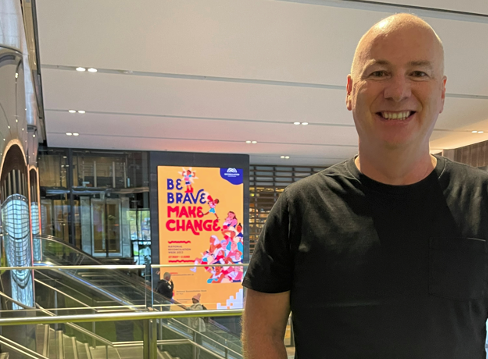Community & Purpose
To be brave, we need to be vulnerable
“It’s okay to say I don’t know, put my hand up and admit that I need to learn more. That’s bravery. The next step is to actually do something about it, not ignore it.” Ken Adams, ANZ’s Group General Counsel and Executive Sponsor of ANZ’s Reconciliation Network.

Ken Adams, Executive Sponsor of ANZ’s Reconciliation Network.
This year’s National Reconciliation Week theme “Be Brave. Make Change.” is a challenge to us all to tackle the unfinished business of reconciliation - so we can Make Change for the benefit of all Australians.
I recently sat down with Glenn Turnham, Chair of ANZ’s Reconciliation Network, for a chat about this year’s theme ‘Be Brave. Make Change’, the link between vulnerability and bravery, and what we can do to make meaningful change.
Glenn: What is your personal reconciliation journey? And what do you hope to achieve by showing bravery and vulnerability?
Ken: Given my experience in the justice system, I’ve always had a strong sense that there was a profound injustice in Australia’s society. Things aren’t right and I felt I hadn’t done enough about it.
I like David Morrison’s (Lieutenant-General Morrison, Chief of the Army) statement: The standard you walk past is the standard you accept. And I no longer felt right walking past this issue without asking questions and becoming more educated. This meant being vulnerable – admitting that I did not know as much as I should.
It’s okay to say I don’t know, put my hand up and admit that I need to learn more. That’s bravery. The next step is to actually do something about it, not ignore it.
Glenn: What are some of the ways you’ve educated yourself?
Ken: Through ANZ, I participated in cultural awareness workshops held by Mundanara Bayles and BlackCard. I’ve since extended this to the legal team at ANZ.
The next step has been integrating this into my personal life. It’s been incredibly important having the conversations within our household and our extended family. I’ve also read a lot about the Uluru Statement from the Heart and, slowly but surely, I’m gaining a more nuanced understanding of the issues and my own knowledge gaps.
Glenn: How can each of us do more to be brave and make change, both at work and outside of work?
Ken: Part of being a leader is to facilitate opportunities for people to have conversations and learn more. One way leaders can set an example is to start any significant meeting with an Acknowledgement of Country.
At ANZ, employees have many opportunities to help build their cultural awareness and participate in making change, both by engaging with the Reconciliation Action Plan (RAP) and the learning experiences offered by the Reconciliation Network.
The energy that our people put into the RAP and Network is infectious and energising. Our RAP commitments give us a framework so we can all participate in progressing towards a reconciled nation.
Outside of work, it’s about having more conscious discussions with your community and families. It’s at that point, when you become more immersed and knowledgeable, that you are then able to help other people, and take this conversation and learning to the broader community to spark change in reconciliation.
National Reconciliation Week: 27 May- 3 June
These dates commemorate two significant milestones in the reconciliation journey— the successful 1967 referendum and the High Court Mabo decision, respectively.
27 May 1967: On this day, Australia’s most successful referendum saw more than 90 per cent of Australians vote to give the Australian Government power to make laws for Aboriginal and Torres Strait Islander people and recognise them in the Census.
3 June 1992: On this day, the Australian High Court delivered the Mabo decision, the culmination of Eddie Koiki Mabo’s challenge to the legal fiction of ‘terra nullius’ (land belonging to no one) and leading to the legal recognition of Aboriginal and Torres Strait Islander peoples as the Traditional Owners and Custodians of lands. This decision paved the way for Native Title.
Reconciliation must live in the hearts, minds and actions of all Australians as we move forward, creating a nation strengthened by respectful relationships between the wider Australian community, and Aboriginal and Torres Strait Islander peoples. – Ken Adams
Ken Adams, ANZ’s Group General Counsel and Executive Sponsor of ANZ’s Reconciliation Network.
Related Articles:
Inside ANZ
Developing cultural competency and why it’s important
Community & Purpose
